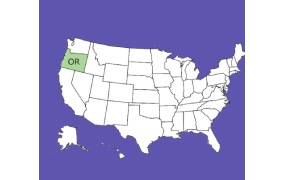The OLCC announced several changes to the tax compliance rule this weekend at the Cannabis & Psychedelic Section of the Oregon Bar Association’s annual conference (where I was pleased to moderate a panel on the failures of legalization). This rule has been a hot topic in Oregon cannabis for several months and the OLCC will be enacting permanent rules on this issue soon.
We’ve written about the tax compliance rule on several occasions: e.g. here, here and here. For now, here’s a quick refresher on the subject. On June 15, 2023, the OLCC approved temporary rules requiring marijuana retailers to obtain a Certificate of Tax Compliance (“Certificate”) from the Oregon Department of Revenue (“DOR”) as a condition for acquiring or renewing a marijuana retailer license, as well as for changes of ownership and adding someone to a license. These new rules resulted from a directive by Governor Kotek following the La Mota scandal that led to the resignation of the Oregon Secretary of State, Shemia Fagan.
In short, the temporary rule applied to marijuana retailers, not processors, producers, or wholesalers. The rule mandated that every “applicant” on a license submit a certificate of tax compliance from the Oregon Department of Revenue (“DOR”) at the time of application, or at the time of license renewal, and in connection with certain changes of ownership.
The OLCC is poised to enact permanent rules that will replace the temporary rules. Here are a few key points the OLCC shared with us at the conference in italics, followed by my commentary:
- The permanent tax compliance rule will not expand to include processors, producers, or wholesalers. This had been a subject of some debate in the past few months. The decision to only require retailers to submit tax compliance certificates makes sense because the problem giving rise to the rule was the non-remittance of sales tax collected at points of sale. In Oregon, such tax is only collected at the retail level. So achieving the goal of timely and full remittance of sales taxes does not require the involvement of non-retail licensees.
- Ability to operate after an incomplete renewal application in limited circumstances. The tax compliance rule involves the DOR timely issuing the certificate of compliance. But what if the DOR is backlogged? Well, the permanent rule contemplates that for renewals submitted prior to expiration or within 30 days after expiration, the licensee may continue to operate for an additional 30 days after the expiration of their license without the certificates of tax compliance if:
- The retailer has submitted an otherwise complete renewal application on or before the license expiration date or within 30 days after the expiration of the license;
- The retailer provides documentation, in a form and manner prescribed by the Commission, showing the retailer is actively engaged in the process of obtaining the required DOR certificates
This is not an excuse to not timely seek a certificate! As the OLCC stated this weekend, the goal is not to cull licenses from good faith licensees who find themselves unable to timely procure a certificate. The OLCC desires to work with licensees to resolve issues with obtaining tax compliance certificates. Indeed, the OLCC may grant an additional 60-Day extension to the timeframe if the Commission determines the extension is reasonably necessary to obtain DOR certificates. But this obligates licensees to work with the OLCC and DOR in good faith in doing so. Plan ahead and keep the OLCC apprised of issues with obtaining certificates of tax compliance!
- Failure to provide required certificates will result in the renewal application being considered incomplete. This is not a change from the temporary rule, but its importance bears repeating. An incomplete application means no license renewal, which means no selling cannabis. Although licensees can submit a written request for reconsideration of a decision that an application is incomplete, there is no right to a hearing presently contemplated. So this is not akin to receiving a charging document for license cancellation.
Stay tuned for more on the tax compliance rule and for further reading, see the OLCC’s FAQ and overview on the new rule here and here.




